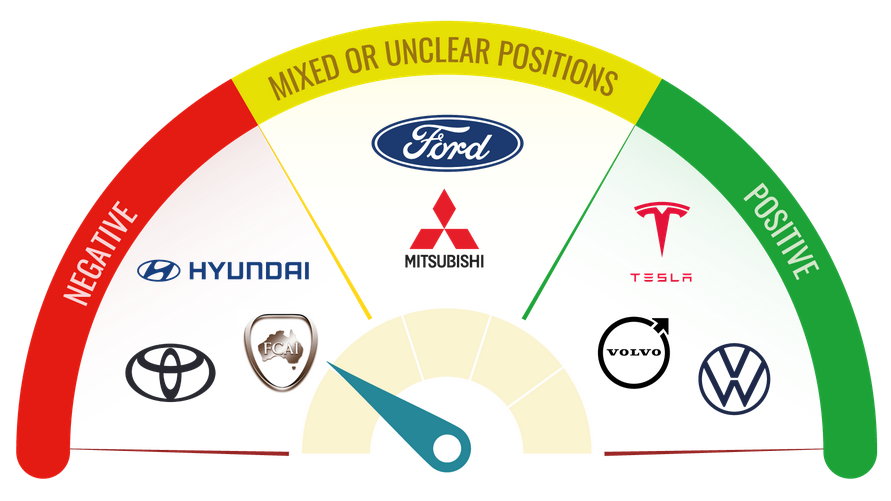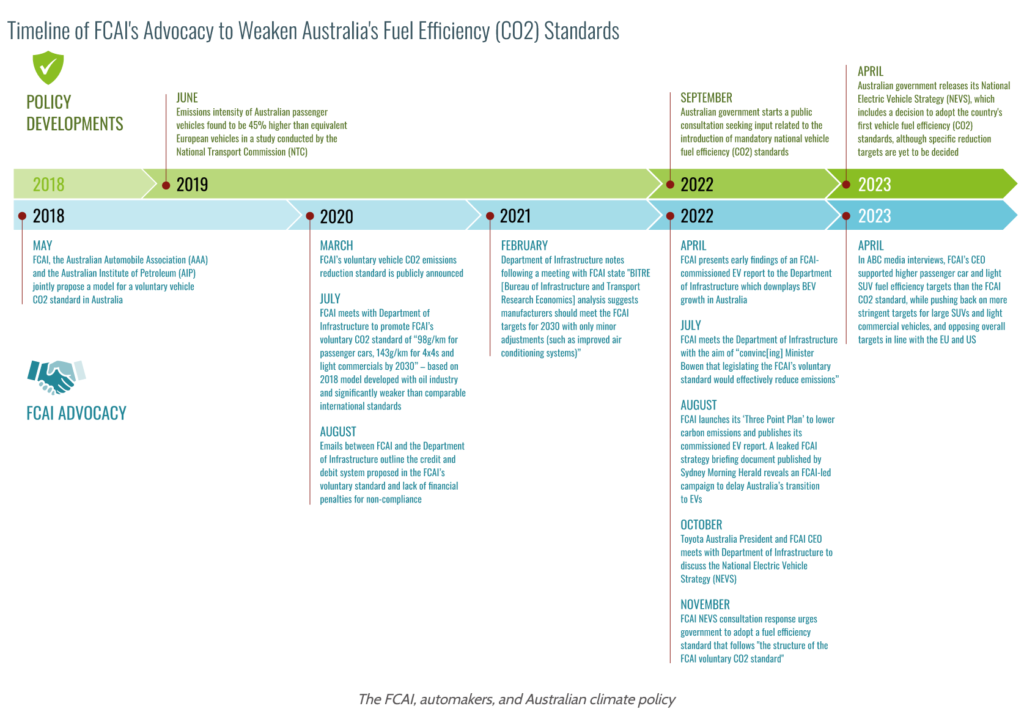FCAI accused of applying EV handbrake
- PostedPublished 13 October 2023
A recent report by InfluenceMap, a global think tank focused on climate policy, has accused the efforts of the Federal Chamber of Automotive Industries (FCAI) of lobbying to weaken Australia’s vehicle emission standards and hinder the adoption of electric vehicles (EVs). The report, titled “The FCAI and Australian Climate Policy,” relies on over 500 pages of previously unseen documents obtained through multiple Freedom of Information requests, revealing confidential briefings to government officials.

According to InfluenceMap, the FCAI, dominated by major international car manufacturers, has adopted a playbook similar to the oil industry, aiming to weaken climate rules that promote battery electric vehicles. Ben Youriev, programme manager at InfluenceMap, states, “These documents show the FCAI and some of its key members are advocating to lock in a longer-term role for combustion-powered vehicles by introducing significantly weaker fuel efficiency rules than in other regions like the US, EU, and New Zealand.”
A July 2020 FCAI presentation to the Department for Infrastructure by the FCAI proposed voluntary CO2 standards that fell significantly short of international norms. It also contained penalty-free loopholes and credits supporting combustion engines, divided the automotive industry into passenger cars and light-duty vehicles, retained control over data collection and methodology, and had an enforcement date of 2030 that contradicted the government’s own modelling. According to InfluenceMap, the FCAI presented arguments to policymakers claiming that their standards would not adversely affect emission regulations.
FCAI chief executive Tony Weber claims the InfluenceMap report is misleading, stating that the FCAI has been transparent in publicly presenting their work towards an achievable emissions reduction target, which has been a central focus for nearly a decade. He said, “Our voluntary standard was established back in 2019 in the absence of a federally mandated standard; the government has announced its intention to develop a standard, and we are working with them to set an ambitious yet achievable target for emissions reduction. We have been asking for this for almost a decade. We are concerned that the London-based InfluenceMap appears to be creating documents and representing them as FCAI commentary. This is inappropriate and misleading. The world has moved on from 2019. Australia’s motoring industry has moved on. It’s time these groups moved on as well.”

The InfluenceMap report also raises concerns regarding fuel efficiency standards and accuses Toyota and Hyundai of engaging in negative advocacy. It raises questions about the involvement of their CEOs on the FCAI board and brings attention to the FCAI’s funding model, which heavily relies on membership fees linked to new vehicle sales. It also highlights that automakers with a limited presence of battery electric vehicles contributed significantly more to the organisation’s finances.
Furthermore, in April 2023, the FCAI presented a report to the Department of Infrastructure that underestimated the growth of battery-electric vehicles (BEVs) in Australia. Their projection of BEVs accounting for only 3% of sales in 2023 turned out to be highly inaccurate. As of April 2023, nationwide BEV sales had already reached 8%, with some regions, like the Australian Capital Territory (ACT), experiencing even higher rates of 20%. The actual growth rate suggests that BEVs could potentially reach 20% nationwide by 2024, which is six years earlier than the FCAI’s forecast. These findings highlight the significant potential for the accelerated adoption of electric vehicles in Australia.
The Electric Vehicle Council (EVC) has consistently expressed concerns about the inclusion of off-cycle credits and air-conditioning credits as proposed by the FCAI. The EVC argues that these credits would undermine the overall ambition of the standard by allowing car manufacturers to offset higher emissions, ultimately delaying the availability of low- and zero-emission vehicles in Australia. Emphasising the importance of a robust vehicle efficiency standard, the EVC insists that improvements in fuel efficiency and air conditioning efficiency should not overshadow the urgent need to transition to cleaner transportation options, specifically electric vehicles.

During the government’s recent consultation on the National Vehicle Efficiency Standard (NVES), citizens and organisations were given the chance to express their concerns and advocate for more stringent regulations. Among these voices was the Electric Vehicle Council (EVC), which recommended disregarding the FCAI’s proposal for credits.
“Australia is already so far behind the rest of the world, and our transport emissions are skyrocketing. If we’re ever going to catch up, we need a Fuel Efficiency Standard that meets and beats the commitments of our major trading partners like New Zealand and the European Union and doesn’t have dodgy loopholes like “super credits” for car makers as they have in the United States.” Solar Citizens clean transport campaigner Ajaya Haikerwal said.
In addition to its other concerns, the EVC proposes that the government establish an independent, self-managed database for new vehicle data. Currently, the responsibility of reporting official new vehicle sales data lies with the FCAI. The EVC argues that this arrangement can create a lack of transparency and leave room for potential conflicts of interest and the dissemination of biassed or manipulated information.
“Today’s report is yet another troubling indictment of the fossil fuel-powered car lobby’s continued efforts to sway policymakers to weaken climate legislation,” Greenpeace Australia Pacific campaigner Joe Rafalowicz said.
The InfluenceMap report brings attention to the potential consequences of the FCAI’s actions. If their lobbying efforts prove successful, there is a concern that the FCAI could influence policies that hinder the adoption of electric vehicles, instead favouring combustion engine vehicles, raising questions about Australia’s commitment to combating climate change and transitioning to a sustainable transportation system.
- CategoriesIn SightGlass
- Tagselectric vehicles, EV, FCAI, lobbying, SightGlass News Issue 30

